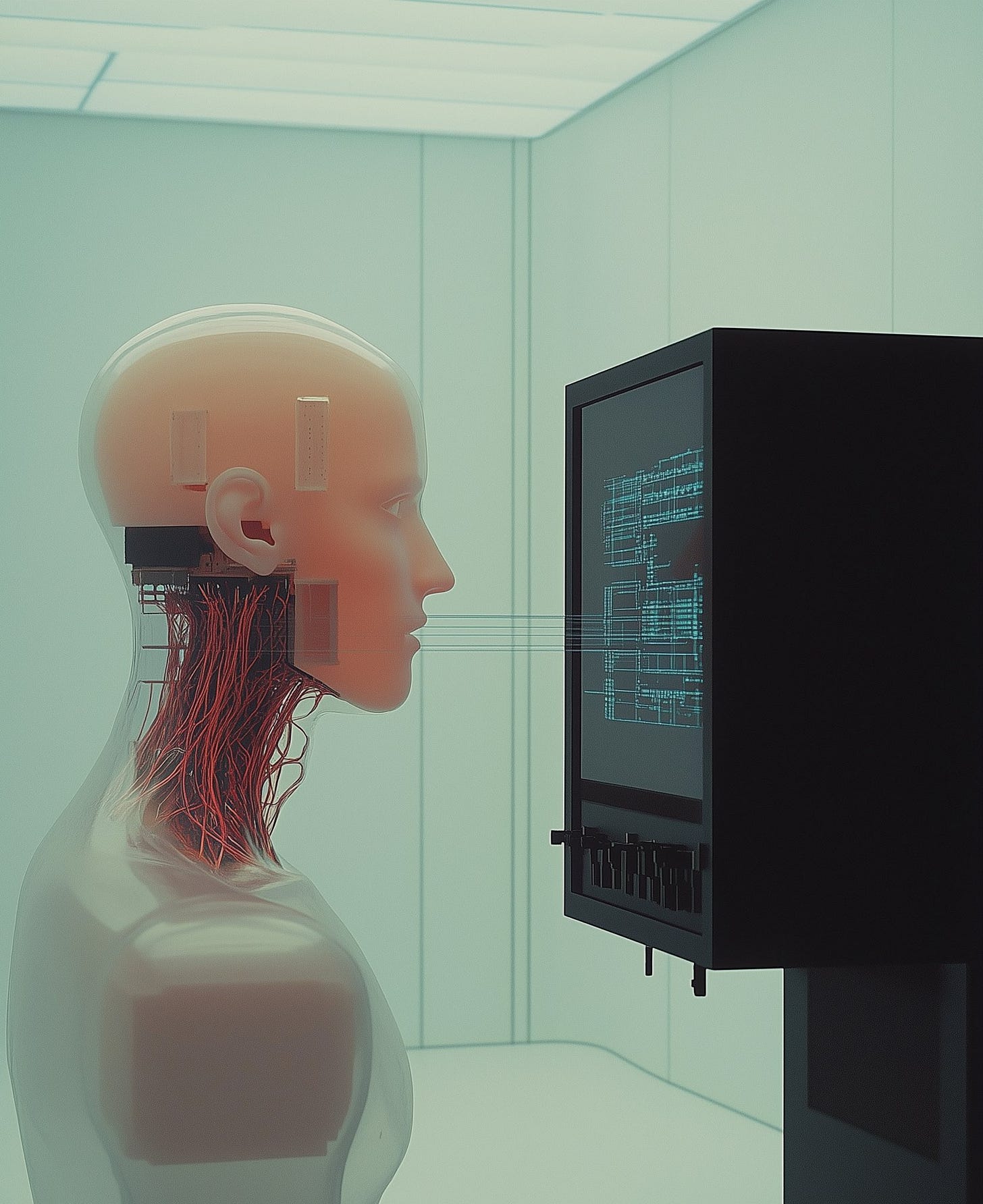We Doomscrollers
What Schopenhauer and Jünger tell us about America's favorite pastime.
Baseball was once America’s pastime. Now, America has a new one. We do it while we watch baseball. We do it while we go to the bathroom. We do it while we fall asleep, and we do it when we wake up. We doomscroll.

Arthur Schopenhauer says in The World as Will and Representation:
The life of our body [is] only a constantly prevented dying, an ever-deferred death. Finally, the alertness and activity of our mind are also a continuously postponed boredom. Every breath we draw wards of the death that constantly impinges on us.1
Schopenhauer understands life as deferred death. Death is an inevitability. In his pessimistic worldview, we are filling time until we expire.
According to Schopenhauer, the fundamental force of reality is the will. The will animates all movement and change. The will also animates man. The will moves for a reason. Schopenhauer states that the basis of all willing is need. The will needs what it lacks, and it knows it needs something because lack is painful. Therefore, the will is fundamentally connected to pain. When needs are met, and the pain goes away, the will faces a different problem. Fearful emptiness arrives, and simply being becomes an intolerable burden. This is boredom. He says: “Life swings like a pendulum to and fro between pain and boredom, and these two are in fact, its ultimate constituents.”2
To cope with boredom, we constantly amuse ourselves. As life becomes relatively easier, thanks to technology, economies of scale, and sanitation, the will does not have to worry as much about basic survival. But what does one do when all needs are met, and there is nothing left to do? Necessity is easy. If something is necessary for survival, the will does it without question. Free time is a burden because one must choose. The facts of reality no longer choose.
As soon as want and suffering give man a relaxation, boredom is at once so near that he necessarily requires diversion and amusement. The striving after existence is what occupies all living things, and keeps them in motion. When existence is assured to them, they do not know what to do with it... Accordingly we see that almost all men, secure from want and cares, are now a burden to themselves, after having finally cast off all other burdens.
Most of us do not experience very much pain regularly. We have indoor climate control and can relieve ourselves in sanitary conditions. Food is cheap enough and easy enough the hunger pangs are a minor annoyance instead of a warning of impending doom. Injury and sickness still harm us, but human life is far from the nasty, brutish, and short existence that Hobbes described. We have become complacent in our new, comfortable lives. This has changed us. We no longer see pain as a necessary component of life. Rather, pain is treated as something to be avoided.
Jünger explores our transformed relationship to pain in On Pain. Similar to Schopenhauer, Jünger recognizes pain and suffering as inevitable components of life. Man’s relationship with pain has transformed because man’s relationship with his body has transformed. Jünger explains the pre-modern conception of the body as an outpost governed by a command center that views it as an object and instrument. He is not speaking of Cartesian dualism but rather of a spiritual and transcendent command in which the interests of the body are a secondary concern. Jünger writes:
This detachment emerges wherever man is able to treat the space through which he experiences pain, i.e., the body, as an object. Of course, this presupposes a command center, which regards the body as a distant outpost that can be deployed and sacrificed in battle. Henceforth, all measures are designed to master pain, not to avoid it. The heroic and cultic world presents an entirely different relation to pain than does the world of sensitivity. While in the latter, as we saw, it is a matter of marginalizing pain and sheltering life from it, in the former the point is to integrate pain and organize life in such a way that one is always armed against it. Here, too, pain plays a significant, but no doubt opposite, role. This is because life strives incessantly to stay in contact with pain. Indeed, discipline means nothing other than this, whether it is of the priestly-ascetic kind directed toward abnegation or of the warlike-heroic kind directed toward hardening oneself like steel. In both cases, it is a matter of maintaining complete control over life, so that at any hour of the day it can serve a higher calling. The central question concerning the rank of present values can be answered by determining to what extent the body can be treated as an object. The secret of modern sensitivity is that it corresponds to a world in which the body is itself the highest value. This observation explains why modern sensitivity relates to pain as a power to be avoided at all cost, because here pain confronts the body not as an outpost but as the main force and essential core of lite.3
After modernity, the body is the most important part of the human. Materialism denies or rejects anything transcendent to the body. Enduring pain for the sake of a higher aim is nonsensical under materialist standards. Jünger harmonizes the priestly and warrior classes by identifying their shared appreciation for pain. The vulgar masses of the modern age only seek pleasure. FanDuel Americans will not renounce their earthly passions to pursue martial or priestly virtue. Instead, we live in a perpetual state of catatonic boredom.
Instead of integrating pain and suffering into life, we flee from it. But when we depart from pain, we do not find pleasure. We find boredom instead. Schopenhauer explains that pleasure and pain are not found in a present object. Instead, the object of pleasure and pain is anticipation. When change appears, we are moved with intense emotion. The emotion, either positive or negative, quickly disappears. It was only an illusion, Schopenhauer explains. Pleasure and pain stem from our expectations of the future. Advances in neurochemistry proved Schopenhauer correct on this point. Dopamine, the brain’s pleasure chemical, is primarily released from anticipation. Dopamine is a tugboat, drawing the brain forward to the next thing. But it is fleeting, and once we have attained the object of desire, we must keep moving forward.
Schopenhauer explains that we “strive from desire to desire,” but with “every attained satisfaction,” we are still unsatisfied.4 When we do not have what we desire, it seems like the greatest possible thing. Shopping is more enjoyable before one has made a single purchase. The possibility of things to be owned is more enjoyable than the things themselves. The gambler never achieves lasting happiness from the big win. The anticipated pleasure of the next big win is always bigger. Desire draws us forward in a never-ending desperation to escape boredom.
In the technological age, desire abuses us like never before. We would like to escape boredom with the least effort possible. Social media is optimized to give us the fastest possible escape. Technology has become our uniform, Jünger explains. “Yet we are too deeply immersed in this process to comprehend it to its full extent.”5 Our escape from boredom is promised in technology. So we doomscroll. Whether it is Facebook, TikTok, X, or Instagram, we keep on scrolling. We never find the post that fulfills all desires. Our thumb and index finger sprint down the feed together, running as fast as they can from the rapidly gaining abyss of boredom. It is coming. Keep scrolling.
Schopenhauer describes the desire to interact with the object. We “write their names up at places worth seeing which they visit, in order thus to react on, to affect the place, since it does not affect” us.6 We have to throw a coin in the fountain. We have to sign the wall at the hipster coffee house. And we definitely have to take a picture and post it on Instagram. Schopenhauer continues, saying that we “cannot easily just contemplate a rare and strange animal, but must excite it, tease it, play with it, just to experience action and reaction.”7 Tap on the fish tank. Howl and woop at the ape in the enclosure. Social media makes it easier to interact. Click the like button and share with the group chat. DM it to your friend you never have a substantial conversation with, just to affirm you exist. You are not telling him. You are telling yourself.
We do this because we fear boredom. If we are bored, we might think. We might think about ourselves, and that is painful. Pain is what we are trying to avoid, so we definitely cannot do that. We have to keep doomscrolling because, at least, it is a form of activity. We remain perpetually unsatisfied, though. Many recognize that they are wasting time as they doomscroll. We know there is something else. There has to be. Life cannot just be brief events of emotional intensity interspersed with endless doomscrolling. “We find ourselves in a situation where we are still capable of grasping what is lost,” Jünger says; “we can still sense the destruction of values and how the world is becoming more shallow and superficial.”8
Escaping the dopaminergic boredom-stimulation cycle is not impossible. Not yet, at least. But it is harder than ever. This is an alternative. Jünger spoke of willingly engaging pain in day-to-day life. As stupid as it may seem to cultivate martial or saintly virtue at an Excel monkey desk job, such spiritual cultivation remains necessary. Schopenhauer describes “the finest part of life” that “lifts us out of real experience, and transforms us into distinguished spectators of it, is pure knowledge which remains foreign to all willing, pleasure in the beautiful, genuine delight in art.”9 Contemplation of pure ideas is not enough, however. Schopenhauer states that contemplation of pure ideas is available “only as a fleeting dream.”10 In general, Schopenhauer recommends that we should view the world “with perfect clearness as a whole and in their connexion, and resolutely to guard against actually lending them the colour we should like them to have.”11 He advises Stoic virtue, a detachment from relying on the emotional highs to get through life. We must avoid the delusion of desire, and seek instead “unshakeable equanimity.”12 Refuse to follow desire, refuse to be tortured by boredom. Become okay with it. Recognize pain as inevitable, and pleasure as a fleeting blessing. Then, perhaps, we can stop doomscrolling.
At least until the phone buzzes again.
If you enjoyed this piece, please leave a LIKE and SUBSCRIBE.
For 15% off NicNac nicotine lozenges, use code AF15XSAVE15 at nicnac.com/drmonzo.
Arthur Schopenhauer, The World as Will and Representation: Volume I (New York: Dover Publications, 1969), 311.
Ibid. 312.
Ernst Jünger, On Pain (New York: Telos Press, 2008), 16-17.
Schopenhauer, 318.
Jünger, 31.
Schopenhauer, 314.
Ibid.
Jünger, 45.
Schopenhauer, 314.
Ibid.
Ibid. 318.
Ibid.



“Our societies today are characterized by a universal algophobia: a generalized fear of pain. “ - I recommend the short book The Palliative Society: Pain Today by philosopher Byung-Chul Han that expands in unison on your thoughts above
I think that doomscrolling taps into repetitive behavior tracts that existed long before we were fully human. Most mammals are prone to these types of behavior, they simply don't have devices perfected to the point of addiction. The psychological distaste for doomscrolling is itself an aspect of boredom. To not be constrained in the psyche requires the discipline to reject repetition. I don't want to be caught by the algorithm, but in the modern age it's always there, chasing you.